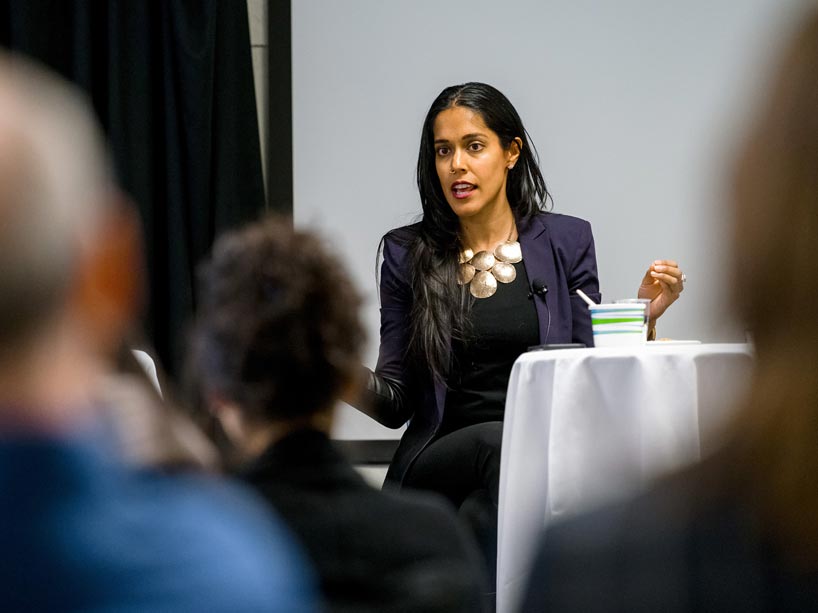Getting comfortable with the uncomfortable

Photo: Activist/consultant Ritu Bhasin is one of the keynote speakers at the White Privilege Conference Global, to be held at Ryerson from May 9-12. Photo by Clifton Li.
“Are Canadians too polite?” This question has been posed in the lead-up to the White Privilege Conference Global, a diverse forum on privilege and oppression hosted by Ryerson’s Office of the Vice-President, Equity and Community Inclusion from May 9-12. In advance of the event, we spoke to two of the keynote speakers, who know that the topic of white privilege can make people very impolite indeed.
Author, speaker and activist Ritu Bhasin, who left behind a career in the legal profession to create bhasin consulting inc. (external link) , is an innovative advisor to organizations around the world. “We provide training in the area of unconscious bias, cultural competence, and inclusion, focusing on practical strategies and behavioural change,” said Bhasin. “What motivated it is that I wanted to devote my life to building a more inclusive society. I wanted to do it on a more macro level, and to do that, I knew I would need a consulting practice.”
John Powell (current executive director and chancellor’s chair of the Haas Institute, professor at the University of California) is a respected expert on civil rights, and a pioneer in the concept of “opportunity-based” housing. His work (including as former director of the Kirwan Institute) has explored how affordable housing and racialized space affect people’s access to employment, education, and health care. “Privilege is distributed across a number of different sectors,” said Powell. “The arrangements of segregated housing, schools, jobs, couldn’t exist simply at the level of personal prejudice.”
Powell advocates for understanding the role that institutions and structures play in racial hierarchies. Though the racial dimensions of gentrification and affordable housing are increasingly understood, addressing them is a complex process. “We just had a bill in California voted down that tried to increase density around transit stops,” said Powell. “Many of the well-heeled areas clearly didn’t want increased density and multi-family housing: ‘I like the idea of diverse housing, but I don’t like low-income housing, I don’t like multi-family housing, I don’t like apartments.’ I think that’s more pronounced.
“But in California, affordable housing is not just affecting low-income people of colour. It’s affecting middle-class people, everybody, and it threatens the economy. There is potentially a larger coalition.”
This year’s White Privilege Conference comes in a time when race has undergirded everything from the 2016 presidential election to the rise of far-right politics in Europe to the global refugee crisis. It’s no surprise, then, that the White Privilege Conference has been vulnerable to controversy and misconceptions. “The term ‘white privilege’ is uncomfortable to us in Canada particularly, because we have not been taught to openly talk about and explore these questions,” said Bhasin. “And I understand that, because it is uncomfortable: we’re talking about forms of supremacy, power and privilege, and we’re doing it directly.”
Powell notes that some discomfort comes from the fact that privilege comes in multiple vectors. “A lot of white people are in a state of either stagnation or falling, so it’s hard for them to understand. ‘How do I have privilege? I don’t have insurance, I can’t pay for my car.’ … People always bring up people in Appalachia, and yes, if you’re born in poverty, don’t have an education, don’t have good health care, you’re probably not doing so well.”
The danger comes when vectors of privilege are not interrogated, but rationalized. “Add to that Trump saying that Mexicans are here to rape women and steal jobs, you have a background narrative of, ‘Well, they’re not working hard, they don’t have a two parent household…’—all these excuses. With whiteness and any dominant culture, there comes a dominant script—what we might even call ‘narrative ideology.’ Why don’t women make as much as men? We don’t say it’s because we’re sexist—we say it’s because they don’t go to college, or they stay home with the kids, or they don’t do math as well. You have a whole number of ideas that purport to be, ‘I don’t carry gender animus, but in terms of functionality, women are not as good as men.’ You have the same kind of script around race: ‘I don’t have any racial animus, but…’”
There may be controversy, but there is also an appetite to discuss these issues, and it’s undeniable that the concept of “white privilege” has entered the mainstream.
“A lot of the language we are hearing now hails back to oppression theorists of decades past, like bell hooks and Audre Lorde,” said Bhasin. “I would say that mainstream society is now becoming more fluid in language and concepts that have been studied for decades.
“With demographic shifts, the increasing empowerment of people from marginalized communities, and social media, now we’re able to see people’s experiences of violence and oppression actually on television. A number of factors have come together—we are now more vocal about how white supremacy is being seen.”
The White Privilege Conference Global takes place May 9-12 at Ryerson, with more than 70 workshops and presentations. Topics include the meaning of the Indigenous Land Acknowledgments; the intersection of disability and race; the legacy of the n-word; inclusive design; the sociopolitical challenges faced by Chinese Canadians; and many more. Other keynote speakers include Shirley Cheechoo (chancellor at Brock University, artist, actor, filmmaker), Rinaldo Walcott (director of Women and Gender Studies institute at U of T), Jane Fernandes (president at Guilford College), Desmond Cole (journalist and activist), and Adrien K. Wing (associate dean at the University of Iowa, author and editor).
To register, go to https://www.torontomu.ca/wpc-global.